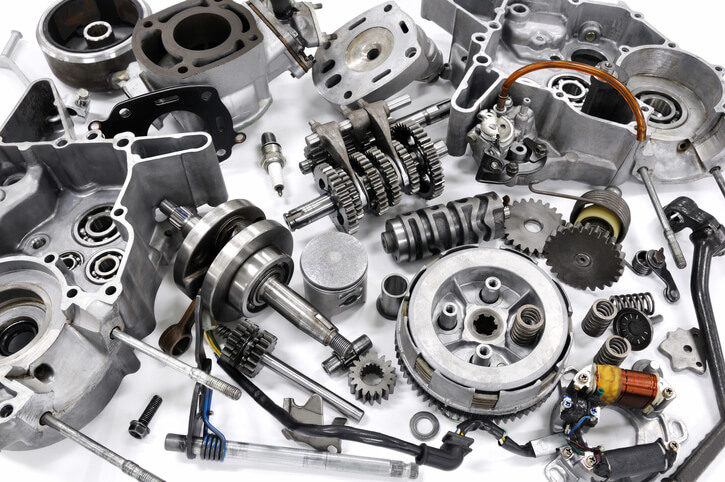Mechanic-Approved Advice Using Motorbike Components NZ
Mechanic-Approved Advice Using Motorbike Components NZ
Blog Article
Discover the Vital MotorBike Parts You Required for Optimal Efficiency
Recognizing the vital parts of a motorcycle is essential for attaining peak efficiency. Each part, from the engine to the stopping system, plays an essential function in general functionality and safety and security. Regular upkeep can protect against unanticipated failings and improve the riding experience. However, many riders neglect the complexities of these systems. Discovering just how they collaborate can cause an extra effective trip. What essential components should every motorcyclist focus on?
The Engine: The Heart of Your Bike
The engine works as the core part of a motorbike, driving its efficiency and defining its capabilities. It is accountable for converting gas into mechanical power, which powers the bike forward. Different sorts of engines are utilized, including single-cylinder, V-twin, and inline arrangements, each offering distinctive attributes matched for various riding objectives and styles. The engine dimension, generally determined in cubic centimeters (cc), considerably influences performance, with larger engines normally supplying even more power and torque.Furthermore, the engine's design and innovation, such as gas injection systems or air-cooling versus liquid-cooling, affect effectiveness and dependability. Maintenance is vital for peak procedure; variables like routine oil changes and monitoring ignition system guarantee durability. Motorcyclists commonly consider an engine's responsiveness and smoothness, as these characteristics improve the overall riding experience. Inevitably, the engine continues to be an essential aspect that defines not only the bike's efficiency yet also the rider's link to the maker.
The Transmission: Moving Gears Smoothly
The transmission plays a necessary function in a motorbike's efficiency, particularly in the mechanics of equipment changing. Comprehending how to move gears efficiently can enhance the overall riding experience, while normal upkeep assurances peak capability. Appropriate focus to these elements can considerably impact the durability and performance of the motorcycle.

Gear Shifting Mechanics
Smooth equipment moving is necessary for perfect motorcycle performance, substantially impacting both velocity and control. The mechanics of equipment changing entail the interaction in between the clutch, equipment lever, and transmission system. When a motorcyclist engages the clutch, it disengages the engine from the transmission, enabling for an equipment modification without harming the elements. A well-timed release of the clutch, combined with accurate activity of the gear lever, facilitates a smooth adjustment between gears. This process assures that the engine operates within its finest power band, boosting efficiency. Motorcycle Spares Christchurch. Additionally, comprehending the equipment proportions and their impact on speed and torque can aid riders make informed selections during shifts, inevitably contributing to a much more pleasurable and receptive riding experience
Upkeep Tips Value
Routine maintenance plays a vital duty in ensuring that the transmission system operates efficiently, enabling smooth gear changes. Routinely changing the transmission and inspecting fluid is vital, as old liquid can bring about boosted rubbing and wear. Additionally, inspecting the clutch for wear assurances peak engagement and disengagement, protecting against slippage during equipment modifications. Lubrication of relocating parts is equally essential to decrease friction and enhance efficiency. Bike proprietors ought to also keep track of for leakages and unusual sounds, as these can indicate underlying issues. By adhering to these maintenance suggestions, motorcyclists can prolong the life expectancy of their transmission system, guaranteeing that equipment changes continue to be seamless and adding to the general efficiency of their motorcycle.
The Braking System: Ensuring Safety And Security on Every Adventure
Braking systems are basic elements that straight influence a motorbike's safety and performance. They are composed of various parts, consisting of brake pads, blades, calipers, and hydraulic lines, all functioning together to guarantee effective deceleration. The kind of stopping system-- typically either disc or drum-- impacts responsiveness and stopping power.Regular maintenance is crucial to promote peak performance; used brake pads can lead to decreased efficiency and boosted quiting distances. Additionally, the top quality of brake liquid should be checked, as it can absorb moisture in time, jeopardizing braking efficiency.Riders must additionally take into consideration the importance of anti-lock braking systems (ABS), which avoid wheel lockup during abrupt quits, improving overall safety. Correctly operating brakes are not nearly quiting; they instill confidence in the rider, permitting more secure navigation with different terrains. Eventually, a dependable braking system is crucial for enjoying every experience with assurance.
The Suspension: Enhancing Comfort and Control
A well-functioning suspension system considerably adds to a motorbike's general efficiency, matching the efficiency of the stopping system. The suspension plays a considerable role in absorbing shocks from irregular surface areas, assuring a smoother experience while preserving tire call with the roadway. This call is essential for both security and control, permitting riders to browse corners with confidence and precision.Different kinds of suspension systems, such as telescopic forks or mono-shocks, supply differing degrees of comfort and handling. Effectively tuned suspension enhances responsiveness, giving the motorcyclist with a more connected feel to the motorbike. Normal upkeep checks are very important to identify the suspension components, including dampers and springs, are working at their best. A reliable shock absorber not only elevates the riding experience but additionally adds to the long life of various other motorbike components by lessening wear and tear. Because of this, buying high quality suspension is important for any kind of major motorcycle fanatic.
The Tires: Connecting You to the Roadway
Tires play an essential role in a Click Here motorbike's efficiency, serving as the main link between the roadway and the biker. Understanding the various types of tires available can substantially impact dealing with and safety and security. In addition, routine maintenance is essential to ensure peak tire efficiency and have a peek at this site durability.
Tire Types Explained
Exactly how do different tire kinds influence a motorcycle's efficiency? Tire types play a vital duty in establishing a motorbike's grip, handling, and stability. Sport tires, designed for high performance, deal enhanced grip and responsiveness on smooth roads, making them ideal for racing and hostile riding. Alternatively, exploring tires prioritize toughness and comfort, supplying a smoother trip for long-distance travel. Off-road tires, identified by their sturdy walk patterns, master grip on unpaved surface areas, ideal for journey enthusiasts. Furthermore, dual-sport tires blend characteristics from both off-road and on-road classifications, dealing with versatile riding requirements. Inevitably, choosing the right tire kind is essential for enhancing efficiency, making certain safety and security, and improving the overall riding experience.
Maintenance Tips Offered
While riding when traveling, keeping perfect tire problem is vital for safety and performance. Frequently examining tire stress is very important, as under-inflated tires can cause bad handling and boosted wear. It is suggested to check tread depth frequently; worn tires compromise grasp and security. Furthermore, cyclists should search for indicators of damage, such as fractures or bulges, which can suggest the need for substitute. Turning tires periodically guarantees even use, boosting durability. Maintaining tires clean from debris and staying clear of too much curbs can extend their life expectancy. Keeping correct alignment and equilibrium contributes to peak efficiency, decreasing anxiety on various other bike parts. Following these upkeep suggestions will considerably boost the overall riding experience.
The Fuel System: Fueling Performance and Efficiency
The gas system plays an important role in making the most of a motorcycle's efficiency and performance, as it assures the ideal distribution of gas to the engine. It comprises several crucial components, including the gas container, fuel pump, gas filter, and gas injectors or carburetor. Each component has to operate successfully to assure a effective and smooth ride.The gas container stores fuel and provides it to the engine using the fuel pump, which creates the essential stress. A gas filter avoids impurities from going into the engine, while the injectors or carburetor mix fuel with air for combustion.Proper maintenance of the fuel system is important; a blocked filter or malfunctioning injector can bring about lowered performance and enhanced gas usage. By validating that the gas system operates efficiently, bikers can enjoy improved throttle action, far better fuel economic climate, and in general improved riding experience.
The Electric System: Powering Your Experience
An efficient electric system is vital for the general capability and safety of a motorbike, as it powers vital components such as the ignition, lighting, and various electronic systems. This system consists of the battery, which shops energy, and the generator, in why not try this out charge of producing power while the engine runs. The circuitry harness attaches these elements, making sure reliable power distribution.Additionally, merges protect the system from overloads, while relays aid control high-current devices with low-power signals. A well-kept electric system enhances performance by making sure smooth beginnings and constant operation of signals and lights, essential for biker presence and safety.Regular checks of the battery's fee and connections are necessary for preventing electric failings. Bikers need to additionally evaluate wiring for damage, making sure all elements work preferably. Inevitably, a durable electric system adds considerably to the overall efficiency and reliability of the motorbike.
Often Asked Questions
Just how Often Should I Change My Motorcycle's Battery?
The frequency of bike battery replacement relies on use and upkeep (Motorcycle Spares Christchurch). Normally, batteries must be replaced every three to 5 years. Normal checks can aid determine when a substitute is required for peak efficiency
What Devices Do I Required for Standard Bike Maintenance?
For basic motorcycle upkeep, one requires crucial tools such as a socket set, wrenches, screwdrivers, pliers, tire stress scale, and a torque wrench. These tools assist in effective upkeep and guarantee the motorcycle runs successfully and securely.
Exactly How Can I Boost My Motorcycle's Aerodynamics?
To boost bike the rules of aerodynamics, one ought to think about changing fairings, utilizing windscreen extensions, enhancing body position, and minimizing total weight. These adjustments help reduce drag, enhancing stability and fuel performance during experiences.
What Are the Indicators of a Failing Electric System?
Signs of a failing electric system include lowering lights, problem starting, irregular tool readings, and blown fuses. Motorbike Components NZ. Uncommon scents or rust around battery terminals might also suggest underlying issues requiring prompt attention for safety and security and efficiency

Exactly how Do I Pick the Right Oil for My Motorbike?
When picking oil for a bike, one ought to think about the producer's specs, viscosity scores, and the kind of riding. In addition, synthetic versus standard oil can impact efficiency and engine security, affecting the decision substantially. The engine size, typically determined in cubic centimeters (cc), significantly influences efficiency, with bigger engines generally giving even more power and torque.Furthermore, the engine's style and innovation, such as fuel shot systems or air-cooling versus liquid-cooling, influence performance and dependability. A well-functioning suspension system significantly adds to a motorcycle's total efficiency, matching the performance of the braking system. The fuel system plays an important function in making the most of a motorcycle's performance and effectiveness, as it guarantees the optimal distribution of gas to the engine. A gas filter stops contaminants from going into the engine, while the injectors or carburetor mix fuel with air for combustion.Proper maintenance of the gas system is essential; a blocked filter or malfunctioning injector can lead to decreased efficiency and increased fuel intake. A well-maintained electrical system boosts performance by guaranteeing smooth starts and consistent procedure of signals and lights, crucial for rider presence and safety.Regular checks of the battery's cost and connections are important for protecting against electrical failures.
Report this page